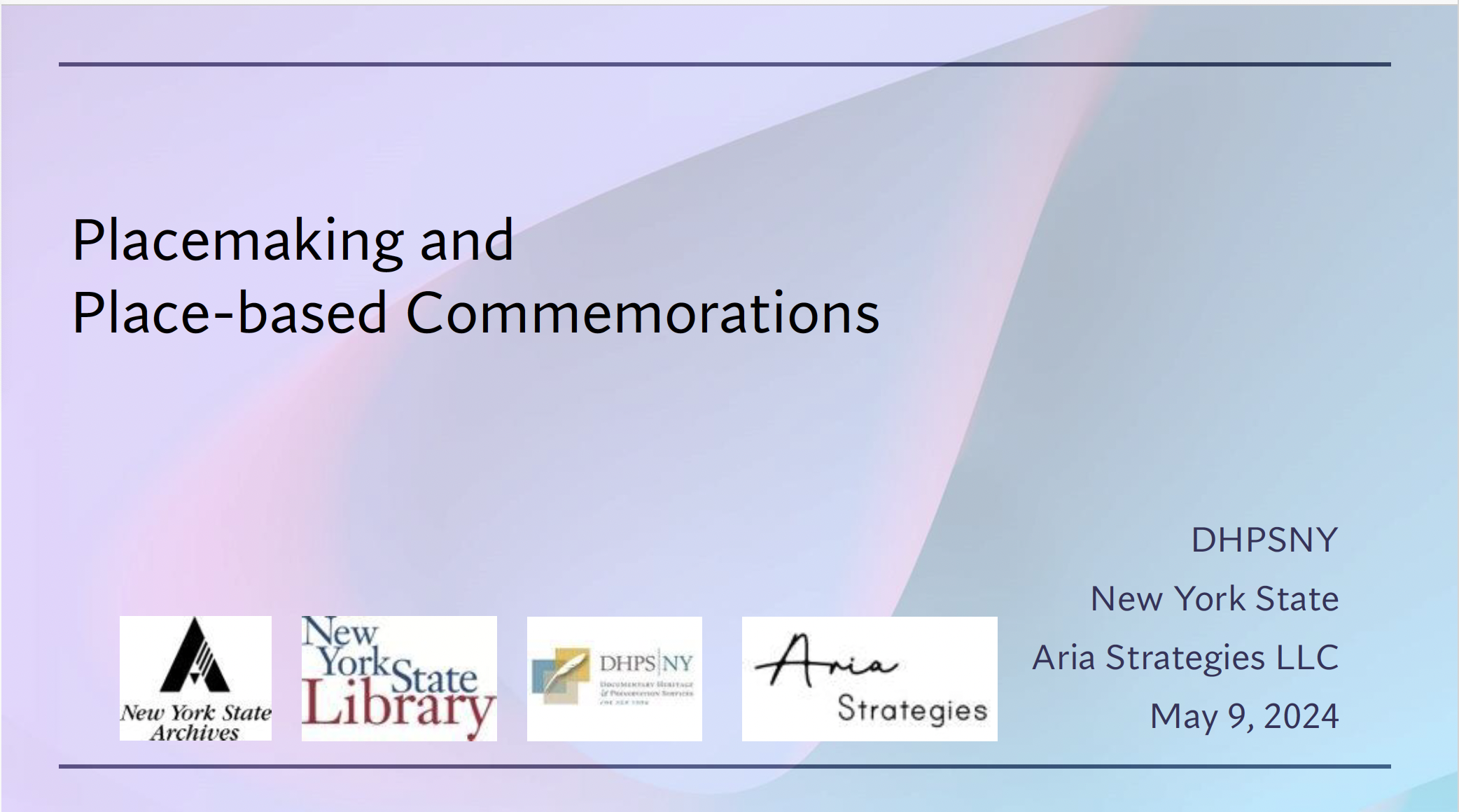
This year's DHPSNY Antiracism Programming takes inspiration from two key resources: the AASLH Making History at 250 Field Guide and the New York State 250th Field Guide. Our guiding question: How do we make our collecting organizations interdisciplinary and representative of the realities of our many New York histories?
Written by DHPSNY Dialogue co-facillitaor Aria Camaione-Lind, Principal & CEO, Aria Strategies LLC
To kick off our DHPSNY Dialogue this May, co-facilitators, Justin Cree (Akwesasne Cultural Center) and Ramin Ganeshram (Westport Museum for History and Culture), invited us to consider some of the foundational knowledge needed to grapple with placemaking and placed-based commemorations. They highlighted the complexity of Indigenous history in what is now New York State and North America, the lack of comprehensive education on Indigenous histories for both schoolchildren and older students, the differing perceptions of land ownership and other cultural norms between European colonizers and Indigenous communities, and the importance of recognizing placemaking as a matter of perspective.
Ramin and Justin encouraged us to explore methods for dismantling Eurocentric perspectives and centering Indigenous viewpoints. This included naming Eurocentric perspectives as based in imperialism, enslavement, and war for land. They also emphasized the importance of approaching Indigenous perspectives with curiosity while acknowledging that most white historians and preservationists are often unaware of the continent's intricate histories, both before and after European contact. Doing this allows us to understand Indigenous perspectives through fluid borders, cultural exchange driven by technology and ideas, and the concept of “Good Mind.” It also allows us to better name and understand the differences between Eurocentric and Indigenous perspectives so we can better inform our organizations’ placemaking efforts and place-based commemorations.
To that end, our co-facilitators posed the following questions as we continue the journey of placemaking and place-based commemorations in preparation for the 250th:
- Which questions do we need to ask ourselves and our organizations to do hyper-local, place-based commemorations?
- What is my need, motivation or desire coming to this space?
- Who benefitted from including some details and excluding or erasing others?
- How can we re-read the archival record in a different way, de-centering European perspectives and instead reading from an Indigenous perspective?
- How can white practitioners in the field bring an open and earnest approach to repairing historic harms?
What do you think? What is your organization working on to better understand and center Indigenous perspectives? How have your 21st century communities benefited from Indigenous communities’ cultural cultivation? How are you reviewing your collection critically to “flip the script” to an Indigenous- or Enslaved-first perspective? In what ways has your organization repaired erasure and/or harm of enslaved, Indigenous and other oppressed groups of people in your community?
You can reach us by email at info@DHPSNY.org, or connect with us on the DHPSNY Facebook page or DHPSNY Community Facebook Group.
Click here for the recording.
Click here to download the slideshow.
Resources for Further Study:
Antiracism from the Indigenous Perspective: Practical Applications, https://www.youtube.com/watch?v=as8DHJJv3t4
Antiracist Approaches to Collections Accessibility, https://www.youtube.com/watch?v=ZW3Wer3q5Mw&t=28s
Blackhawk, Ned. The Rediscovery of America: Native Peoples and the Unmaking of U.S. History. 2023.
Ganandagan White Corn Project, https://www.ganondagan.org/white-corn-project
Oberg, Michael Leroy and Peter Jakob Olsen-Harbich. Native America: A History, 3rd edition. 2022.
Sleeper-Smith, Susan (ed.) et al, Why You Can’t Teach United States History without American Indians. 2015.
Smith, A. Lynn. Memory Wars: Settlers and Natives Remember Washington’s Sullivan Expedition of 1779. 2023.
This post is part of a blog series on sharing information, promoting resources, encouraging discussion, and amplifying the voices of Black, Indigenous, and People of Color (BIPOC) doing antiracism work in archives, museums, history sites, and library special collections. DHPSNY is committed to supporting the diverse network of collecting institutions that safeguard and ensure access to historical records and library research materials across New York State. To learn more, visit our first blog post in the series.